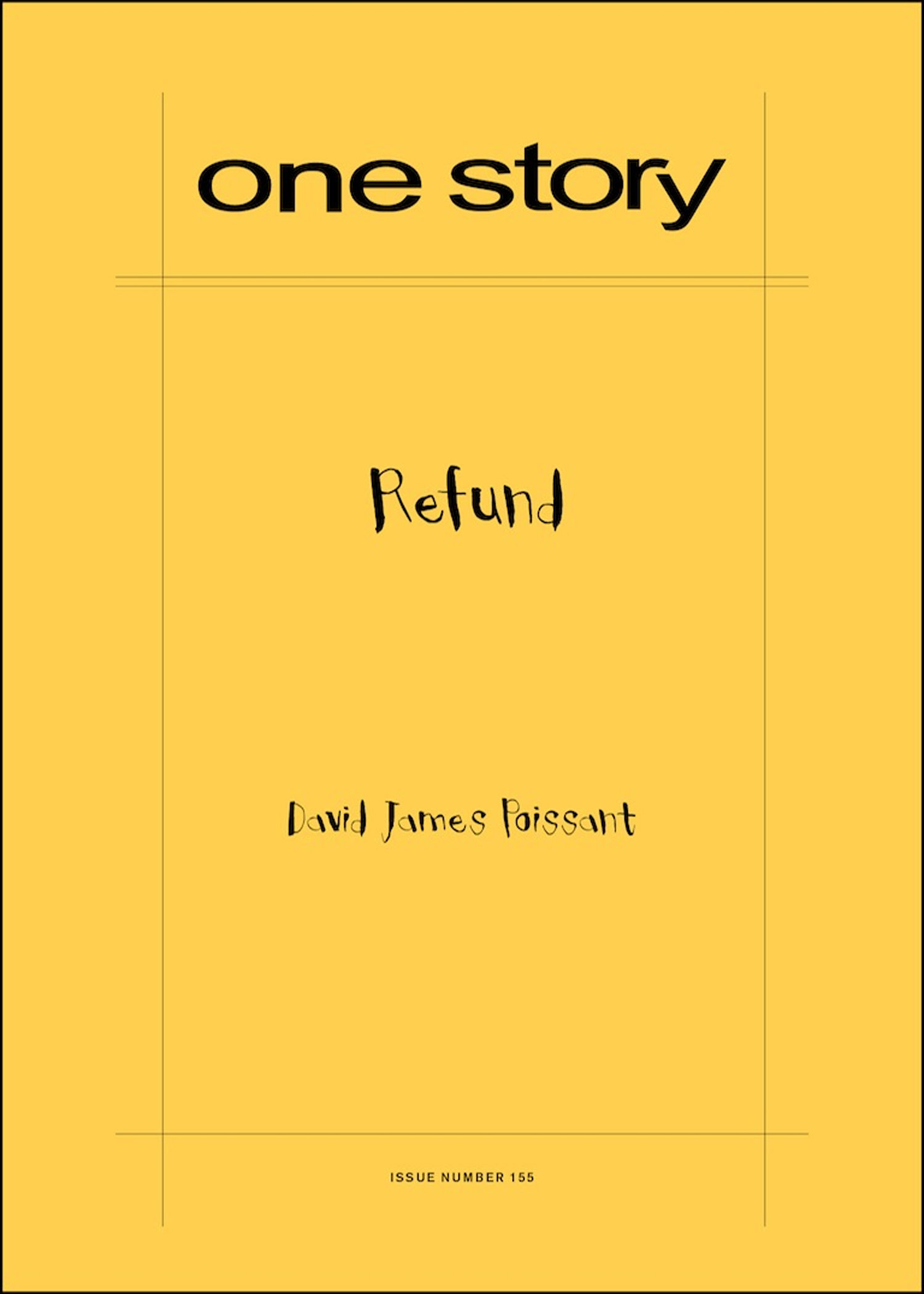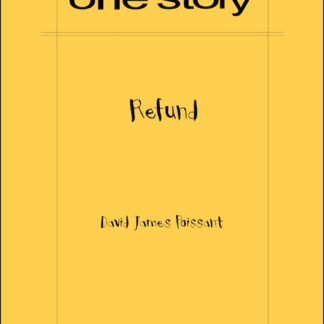
Refund
$2.50
24 in stock
Excerpt
The evening began in argument. Josh’s first grade teacher had called a parent/teacher conference, and Joy and I were expected that night at school. This was not the standard mid-year check-in. For months, we’d been getting notes. Josh wasn’t finishing his schoolwork. Josh didn’t play well with others. Josh wasn’t paying attention in class.
Dinner was over, the table cleared of everything but a cup, a fork, and my son’s plate. On the plate sat a sad mound of boiled-to-death broccoli.
”No cookies,“ Joy said. ”No dessert until dinner’s done.“
Josh had never been big on vegetables. Even as a baby, he’d spit out anything green.
”Broccoli’s good for you,“ my wife said.
”Not like this,“ Josh said. ”Boiled vegetables have no nutritive value. That’s what turns the water green, the vitamins and minerals. What’s left is fiber. And fiber just makes you poop.“
My son, six years old.
Joy sighed and shot me a glance. ”C’mon, Sam, back me up on this.“
David James Poissant
David James Poissant’s stories have appeared in The Atlantic, Playboy, The Southern Review, Mississippi Review, New Stories from the South, Best New American Voices, and elsewhere. He is a winner of the Playboy College Fiction Contest, the George Garrett Fiction Award, the Matt Clark Prize, the Alice White Reeves Memorial Award from the National Society of Arts & Letters, and Second and Third Prizes in the Atlantic Monthly Student Writing Contest. He has attended the Sewanee Writers’ Conference as a Georges and Anne Borchardt Scholar and taught at the Clarksville Writers’ Conference. He holds a PhD from the University of Cincinnati, where he was a Taft Fellow, and an MFA from the University of Arizona, where he served as Co-Editor of Sonora Review. He lives with his wife and daughters in Orlando and teaches in the MFA program at the University of Central Florida. His chapbook Lizard Man, winner of the 2011 RopeWalk Press Editor’s Fiction Chapbook Prize, will be published later this year.
Q&A by Karen Friedman
- KF: Where did the idea for this story come from?
- DP: I grew up in the suburbs of Atlanta, which wasn’t a bad place to grow up. However, as I got older, suburbia started to feel very restricting. At 23, I was married with a house in a neighborhood in Grayson, Georgia less than fifteen miles from the house in which I’d grown up. This was Gwinnett County, a place that prides itself on its school system and where “My Child is an Honor Roll Student at Fill-in-the-Blank Elementary” bumper stickers are a sight common as the Chick-fil-A’s on every corner. I was teaching high school English at the time. My wife, Marla, taught first grade. And every week she came home with stories of parents who were sure their kids were “gifted.” It became a weird sort of middle-class warfare, the war of whose kids were more gifted than whose. I began “Refund” hoping to satirize the situation, but, writing the story, I also found the whole thing really, really sad. That tension, the pull between funny and sad, is what I hope resonates within the story. As for Marla and me, three years after moving to Grayson, we sold the house and moved to Tucson. Now, we have kids (twin two-year old girls), and we find ourselves back in suburbia—just closed on a house in a subdivision of Orlando last month, in fact. Orlando, though, we’re finding, is way more laid back than metro-Atlanta. The schools here are good, but the parents seem less insane. At least, we’re hoping. That, and we’re hoping not to become those parents ourselves.
- KF: What was the most challenging aspect of writing this story?
- DP: Dialing back the funny. I always go overboard, then I have to be reigned in. Writers I admire, writers like Brock Clarke and George Singleton, Ron Carlson and Lorrie Moore, are great at getting you laughing, then pulling the rug out from under you. Sometimes I’m so busy trying to make the reader laugh that I forget the rug.
- KF: Whenever I read the scene between Joy and Sam regarding all the Baby Galileo gear, I always wonder why it doesn’t occur to either of them that while embracing Josh’s intellect is good, they might need to foster some social skills to help him make emotional connections with other kids. (T-Ball, anyone? Chess club?) Is their singular focus on his intellectual well being a comment on the aspirations of this particular set of parents or did you intend it as a broader social critique?
- DP: I hope that it works as a broader social critique. Back in Gwinnett, we had friends who were desperate to get their son reading at a fifth grade level by first grade, or something insane like that. Marla suggested that he play soccer. And wouldn’t you know it, the kid turned out to be great at soccer? Loved it. The parents were shocked. They’d never thought of letting the kid play a sport. I don’t know why more parents can’t see past their kids’ intellects to the obvious, but many can’t.
- KF: Do you think Josh knows he’s different than other children and does he care?
- DP: I think kids know, and I think they care. I think that everyone wants to be accepted, especially as children, but they often don’t know what to do about it. I was a kid kind of like Josh. I was bullied and picked on quite a bit. But, you know, you grow up, you pick up on social cues, you learn to live in the world, and, most importantly, you learn to surround yourself with the kinds of people you love and care about and want to spend time with instead of looking for acceptance from everyone.
- KF: You and I have talked a lot about this, but you’ve left Sam’s reasons somewhat ambiguous, so I must ask, why does Sam clean up the Tweeds’ bathroom after he finds Josh in there?
- DP: Yeah, that’s a tough one. I guess the way I see it, Sam’s ashamed of himself. He sold out his son (he knew the risk sending Josh up those stairs) in order to try to save his marriage. He’s lost his son’s trust, and the only way he knows to earn it back is to keep Josh’s secret about being bullied. Keeping the secret means not making a scene, not telling the other parents, not even telling Joy. He just wants to “make it like they were never there,” if that means Josh might forgive him. He’s not necessarily doing what’s in the boy’s best interests. He only thinks he is.
- KF: At the end of the story, it’s pretty clear that Sam’s marriage is over, that his ties to it are primarily about Josh. What do you think happens to Sam’s relationship with Josh after the divorce?
- DP: Funny you should ask, since we cut that scene! Originally, Sam gets a glimpse into the future. Josh is grown up and they’re no longer close. Sam’s biggest fear is that Josh will grown up brilliant and wind up working for Bill Gates or else teaching in an ivory tower somewhere in New England. That’s probably what will happen: As the two men discover that they have less and less in common, they’ll grow apart.
- KF: How long did it take you to complete this story?
- DP: Oh, God. I wrote the first draft of “Refund” in 2007, so four years. I got really good advice on it from both Leah Stewart and Brock Clarke at the University of Cincinnati, where I was completing a PhD at the time. For years, I never could get the story just right, until it hit me that Sam and Joy were unhappy in their marriage. For a while, I felt like I was writing two stories, one about Sam and Joy, and one about Sam and his son. When the double-helix of those stories came together, I sent it out and was so pleased when One Story picked it up. Then we whacked away at it for another eight months and, finally, it was finished.
- KF: What are you working on now?
- DP: I recently completed a story collection, The Heaven of Animals, for which I hope to find a publisher. I’m now hard at work on a novel set in the fictional town of Christopher, North Carolina. It’s a multigenerational drama that unfolds over the course of a week when three couples come together to say goodbye to the family lake house.
- KF: What is the best bit of advice about writing you have ever received?
- DP: At the University of Arizona, Jason Brown knocked me off my high horse. He encouraged me to banish words like talent and inspiration from my vocabulary and to think of writing as a craft, no more mystical or mysterious than plumbing or woodworking. Like any other craft, to get good at it, you have to study the work of others and work every day to perfect your own craft. I took that message to heart and haven’t looked back.
